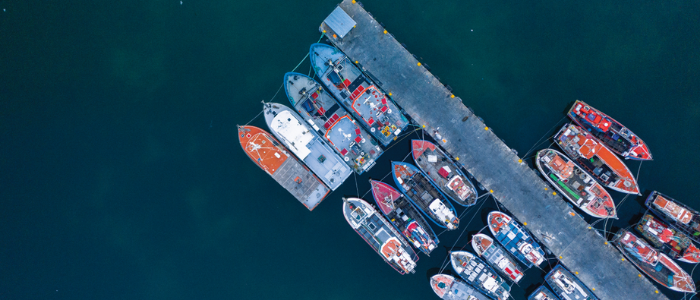
The Marine Stewardship Council’s ‘Fish for Good’ is driving progress in sustainable fishing, with five South African fisheries working to improve their fishing operations.
In 2017 the Marine Stewardship Council (MSC) and the Dutch Postcode Lottery joined forces to launch Fish For Good, a four-year project aimed at guiding fisheries in South Africa, Indonesia and Mexico towards more sustainable fishing practices.
Twenty fisheries were selected to partake in Fish for Good - a flagship ‘pathway to sustainability' project enabling and supporting sustainable fishing in the Global South.
Fisheries in the Global South provide nearly three-quarters of the world’s fish and seafood, but many of them are fishing unsustainably, often because they lack the resources and the capacity to improve the way they operate.
MSC pathway projects support fisheries at various stages of their sustainability journey, by providing them with the tools and support to improve and, in some cases, optimise their sustainability.
In 2018 the MSC conducted a scan of 63 fisheries in South Africa. These were whittled down to 18 that were considered for deeper mapping according to their target species, areas fished, gear used, catch volumes, stock status, environmental impacts and market potential. A shortlist of nine fisheries were pre-assessed against the MSC Fisheries Standard by an accredited third-party assessor, to determine a reference point for sustainable fishing.
The project’s advisory group made up of industry, government and NGO stakeholders in South Africa, then selected a final five fisheries to proceed toward credible
Fishery Improvement Projects (FIPs). These include:
1. Pole and line albacore tuna
2. Hand-collected East coast rock lobster
3. Rope-grown mussel
4. Squid jig
5. Longline yellowfin tuna
The gaps identified in the pre-assessments of the five South African fisheries engaged in Fish for Good were translated into a 'to do' list for each fishery so that stakeholders could begin working together towards improved sustainability. Each action plan was tailored to address challenges specific to the fishery.
Priority improvement actions relate to the development of harvest control rules and fishery-specific management plans, data collection, assessments of fishery interactions with endangered, threatened and protected (ETP) species, reducing catch of non-target stocks, and understanding potential ecosystem impacts.
WWF South Africa, the project’s implementing partner in South Africa, coordinated the action plan development and implementation stages and continue to work with fishery stakeholders in meeting the goals set out in their FIP action plans.
Following the successful implementation of the FIPs, some of the fisheries may meet the necessary criteria to voluntarily enter full assessment for MSC certification.
In 2020 the MSC awarded Ocean Stewardship Fund grants to the Albacore tuna pole and line and the rope-grown mussel fisheries to help them achieve their improvement actions, following expressed interest to meet the MSC’s internationally recognised standard for sustainable fishing.
Andrew Gordon, MSC Fisheries Outreach Manager for Southern Africa, said:
“As well as being vital for food security and people’s livelihoods, fisheries in the Global South overlap with some of the most important marine biodiversity hotspots. Optimising the management of South Africa’s fisheries, through projects like Fish for Good, can deliver sustained benefits throughout the seafood supply chain, benefiting coastal communities while maintaining healthy fish stocks. The fisheries engaged in Fish for Good have shown a real commitment to demonstrating the sustainability of
their fishing operations.”
Bokamoso Lebepe, Fishery Improvement Coordinator at WWF South Africa, said:
“As the project’s implementing coordinator, I believe that the future looks bright for the fisheries that took part in Fish for Good. To some, sustainability means more than just good management practice. For most, it is a way of preserving their livelihood.”
For more about Fish for Good South Africa and the fisheries engaged:
https://stories.msc.org/en/fish-for-good-south-africa/
Watch the Fish for Good South Africa Journey Film.
The MSC hopes the impact of its pathway projects will contribute to the delivery of the UN
Sustainable Development Goal 14, Life Below Water.
Helping more fisheries become sustainable:
The MSC cannot solve overfishing alone. The MSC is collaborating with other NGOs, with governments, retailers and funders, to provide a pathway for fisheries that face obstacles in reaching sustainability.
Beginning with comprehensive analysis of fisheries and their environments, pathway projects like Fish for Good create and help implement action plans in hundreds of fisheries worldwide, and their performance benchmarked against the MSC Fisheries Standard.
Many fisheries may be a long way from reaching MSC certification, but with strong long-term collaboration it can become a realistic goal.
To take a dive deeper into the fishery improvement tools, funding and other support the MSC offers to fisheries transitioning towards sustainability, visit the resource links below:
-- Fishery improvement tools
-- In-transition to MSC
-- Ocean Stewardship Fund
For more information about MSC South Africa visit: msc.org
The Marine Stewardship Council (MSC) is an international non-profit organisation which sets globally recognised, science-based standards for sustainable fishing and seafood traceability. The MSC ecolabel and certification program recognises and rewards sustainable fishing practices and is helping create a more sustainable seafood market. It is the only wild-capture fisheries certification and ecolabelling program that meets best practice
requirements set by both the United Nations Food and Agriculture Organisation (UNFAO) and ISEAL, the global membership association for sustainability standards.



